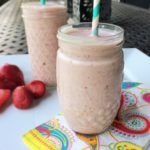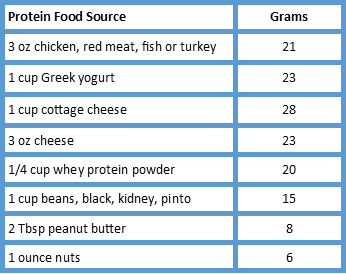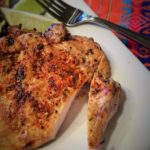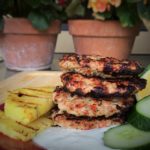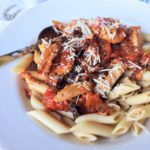Sports Nutrition Part Two: Top Five Myths About Protein
Here are five popular myths about protein which might just surprise you.
Myth #1 You need to eat a lot of protein to build muscle.
Do you think my son (pictured above) and all other athletes like him, built all that muscle just by eating more protein? Muscle is built through weight lifting and resistance training . . . a lot of it, nearly daily or at least every other day. To help support muscle growth, athletes need to eat a high quality protein within 30 minutes of their training to help broken down muscle fibers “upload” the building blocks called amino acids found in protein-rich foods to help with regrowth of muscle tissue. High quality proteins include eggs, fish, poultry, lean red meat, soy protein, dairy products. Additional carbohydrates and fats along with the protein have also been shown to improve muscle recovery. Try apples/cheese/nuts OR bananas/milk/peanut butter OR chocolate milk/bagel/strawberries
Recipe suggestion: High Protein Strawberry-Banana Smoothie
Myth #2 Athletes need substantially more protein than non-athletes.
Although it is true that athletes need more protein than non-athletes, the difference is not substantial. Non-athletes need approximately 0.5 – 0.7 grams protein per pound body weight per day. (For a 150 pound person = 75 – 105 grams protein per day.) Endurance athletes and even strength athletes typically need 0.8 – 1.2 grams protein per pound body weight per day. (For a 150 pound person = 120 – 180 grams protein per day.) This is also assuming that enough carbohydrates and fat are included in the diet. If these are low or missing then additional protein would be needed. (See Myth #4)
Typical protein servings and amounts are included in the chart below:
Recipe suggestion: Chipotle Lime Grilled Chicken
Myth #3 It’s best to eat a large amount of protein at one time.
Current research suggests the trick to optimizing muscle development is to eat protein in smaller amounts spread throughout the day. Athletes should include a form of protein in every meal and snack. This also helps maintain a more steady blood sugar level which improves workout performance. A typical 150-pound athlete needs between 120 – 180 grams protein per day. Break this up between six small meals for an average of 20-30 grams per meal. Breakfast: 3 eggs/vegetables or 1 cup Greek yogurt/fruit/nuts, Snack: 3 string cheeses/fruit, Lunch: 2 ounces turkey/2 ounces cheese sandwich or 3 ounces chicken and black bean salad, Snack: Protein shake, Dinner: 4 ounces steak/vegetables, Snack: 1 cup cottage cheese/muffins
Recipe suggestion: Greek Turkey Burgers with Tzatziki Sauce
Myth #4 It’s OK to cut carbohydrates from an athletes diet to build muscle.
Cutting carbohydrates in an athlete’s diet is basically shutting down the main energy source for workouts and performance. Carbohydrates store as glycogen in our muscles and are the primary fuel source when called upon during exercise. If these stores are low then the body is forced to use protein and some fat for energy needs. Protein comes from muscle, so limiting carbohydrates compromises muscle growth, therefore defeating your goal of building muscle. Neither protein or fat are very efficient energy fuels for the body.
Maintaining at least 55% of total calories from carbohydrates ensures adequate energy. Choose more complex carbohydrates (whole grains, vegetables, beans, pasta) versus simple carbohydrates (fruit, sugar) to help maintain a more steady blood sugar ,thus sustaining energybetter throughout the day.
Recipe suggestion: Chicken Cacciatore
Myth #5 All dietary protein is absorbed at the same rate.
Not true. Studies show that whey protein is more rapidly absorbed than casein protein. The amino acid leucine is a trigger for muscle building, so proteins with more leucine are great for recovery. Animal proteins – including plain or chocolate milk, lean beef and tuna are leucine-rich. Plant proteins contain leucine, but in lower amounts.
Because casein is more slowly absorbed, it makes for a good bedtime snack as it supports muscle-building/recovery through the night. This might be useful for those athletes seeking to build bulk as in pre-seasons. Cottage cheese, yogurt and other dairy products are rich in casein.
Recipe suggestion: Berry Yummy Cheesecake Parfait



